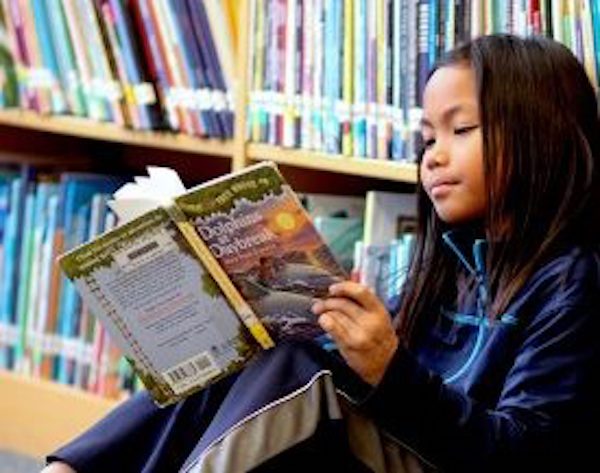by Robert Pondiscio, Senior Fellow and the Vice President for External Affairs at the Thomas B. Fordham Institute
This post originally appeared in Flypaper, the Fordham Institute’s blog, and is re-posted here with permission.
E.D. Hirsch, Jr. turned ninety years old two weeks ago. And the state of Louisiana has given the Cultural Literacy icon and architect of the Core Knowledge curriculum a belated birthday present. In a little-noticed press release issued Monday, the state’s Department of Education announced its plan, under a provision of the federal Every Student Succeeds Act, to develop and pilot a “streamlined English and social studies assessment….that align[s] with the knowledge and books taught in Louisiana classrooms.” Unlike most reading tests, which ask students to find the main idea or make inferences on reading passages about random topics, Louisiana plans to create test items on books and topics test-takers have actually studied in school and try them out in five school districts in the state, including two charter school networks.
If you’re familiar with Hirsch’s work, his many books including The Knowledge Deficit and The Making of Americans; if you understand the connection between background knowledge and language proficiency that he has championed for many decades, then Louisiana’s move is as obvious to you as it is overdue. For the uninitiated, University of Virginia cognitive scientist Dan Willingham in a recent blog post offered an economical summary of the Hirschean oeuvre:
Background knowledge is the main driver of language comprehension, whether written or spoken. Disadvantaged students are disproportionately dependent on schools to provide the background information that will make them effective readers because wealthy students have greater opportunity to gain this knowledge at home.
Simple. Intuitive. Obvious. At least until it’s time for students to sit for a standardized reading test. For years, Hirsch has made the case that such tests are fundamentally unfair to disadvantaged children, particularly low-income children of color, because of the nature of language itself. We may perceive reading comprehension as a content-neutral “skill” that can be taught, practiced, mastered, and tested in the abstract on any random topic, but this is deeply misleading. All reading tests are de facto tests of background knowledge, a point Hirsch made in a 2010 piece in The American Prospect, which I had the privilege to co-author, bluntly titled, “There’s No Such Thing as a Reading Test”:
Researchers have consistently demonstrated that in order to understand what you’re reading, you need to know something about the subject matter. Students who are identified as “poor readers” comprehend with relative ease when asked to read passages on familiar subjects, outperforming even “good readers” who lack relevant background knowledge…Such findings should challenge our very idea of who is or is not good reader.
“The trouble is that by not requiring knowledge of any specific book or facts, reading tests have contributed to the false impression that reading is mainly about having skills such as being able to summarize, and not about background knowledge,” noted Lousiana’s state superintendent of education, John White. “By not requiring knowledge, tests create no incentive for particular knowledge to be taught.” This creates several kinds of mischief in schools trying their best to prepare students for high-stakes exams. When the knowledge demands of reading tests are unknown, it encourages teachers to devalue knowledge and prepare students by teaching comprehension “skills and strategies,” which are of limited value. And thus schools and teachers have no incentive to give disadvantaged kids what they need most: access to the broad general knowledge in science, social studies, the arts, and other subjects that advantaged kids are far more likely to encounter in their daily lives, and which are the true drivers of sophisticated language proficiency
In sum, what Louisiana proposes to experiment with is something of an assessment Holy Grail: a reading test that incentivizes the kind of teaching and learning disadvantaged students need to close pernicious achievement gaps in ELA. Keep that in mind next week when you hear the inevitably depressing results on NAEP reading.
The Louisiana proposal is a modest one, limited to five school districts and charter networks in the state. Modest, but portentous. For the first time, the education leadership of a U.S. state has demonstrated in its assessment policies a grasp of the foundational idea that English language proficiency is not a “skill” like throwing a ball or riding a bike that can be taught and tested in an abstract, content-agnostic way. The pilot signals the critical awareness that language-proficiency is knowledge dependent, and that educational equity is not served by ignoring this or trying to wish it away.
I suspect the pilot may get more attention for reducing the number of tests students take and for spreading them out over the school year, so that students are assessed immediately following a unit’s completion, leading to a cumulative score. But the longer-term win is to drive home the connection between broad general knowledge and broad general reading ability. Once established, that has the potential to have a dramatic impact by challenging the long dominant skills-and-strategies approach to reading instruction in favor of one that sees knowledge development in children—particularly disadvantaged children—as the indispensible Job One of reading instruction in American classrooms.
Bravo, Louisiana. And happy birthday, E.D Hirsch, Jr.
